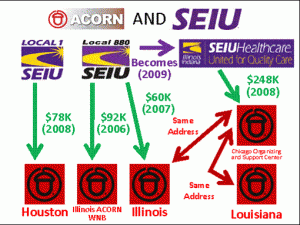The all-consuming debate over health care has effectively sucked all of the oxygen out of the policy world leaving little room for discussion, let alone action on other major elements of the progressive agenda–or so it would seem.
The mammoth bills winding their way through Congress will certainly upend our health care sector, if they are enacted. Little known, however, are several provisions that will provide an enormous pay-off to one of the Democrat parties most loyal constituency–Big Labor.

The Obama campaign spent much of 2008 writing checks to various left-leaning interest groups who saw the opportunity to cash in on long-standing priorities that would finally be achievable with a Democratic Congress and a liberal president. Now, these groups are finding that no one is available to cash these checks as long as the administration is laser focused on reconfiguring one sixth of the American economy.
But organized labor has sought to turn this situation into a new opportunity. By throwing themselves into the health care debate and mobilizing their resources behind passage of the Democrat proposal, labor has been rewarded with the ability to shape the content of the health care legislation and to begin to collect on its political debt.
Hot on the heels of the inauguration labor sought to cash its first big check and push the Employee Free Choice Act (EFCA) through Congress to eliminate the secret ballot for union organizing elections and allow strong arm tactics to “recruit” new members by putting a card in front of them and politely asking them to sign it. Poll numbers consistently showed strong opposition among the public to this idea and the administration quickly realized they couldn’t cover this check.
But there are always new ways to achieve your objectives when the President is your loyal supplicant. The Service Employees International Union provided an estimated $160 million to the Obama campaign and related political advocacy groups and put thousands of its paid organizers on the streets to stump for Democrats. SEIU’s top recruiting priority is unionizing hundreds of thousands of health care workers across the nation.
What better way to get a leg up on unionizing health care workers, (and further driving health care costs up in the process) than by sneaking a few precious policy advantages into federal law via the 1,000-page health care bill?
Among the SEIU sops in the bill are vast new funding mechanisms for home health care organizations. The union has focused on unionizing home health care workers and now the taxpayers will provide hundreds of millions each year to pay these new union members.
The bill also provides $10 billion in direct taxpayer subsidies to pay health care costs for retired union members. This foists the every increasing health care cost of no-longer productive members off on the treasury.
In addition, it sets up all sorts of government bodies to micro-manage the health care industry to the advantage of labor. These bodies will make regulations for the workplace, training and wage levels. They will also serve as “diversity panels” and will be empowered to seek appropriate participation in health care jobs for disadvantaged groups. Buried in Title II, Part 3, Subtitle D of the bill is the requirement that the HHS panel that will set standards for health care employment must have union (read SEIU, the biggest health industry union) representation.
The bill also ties big piles of grant money to unionization. In Title V, Subtitle D, which funds grants for nurse training, the bill limits eligibility for funding to employers that “provides wages and benefits to its nurses…that have been collectively bargain with a labor organization.”
These little set asides tucked away in the bill will strengthen SEIU’s hand by helping it unionize more of the health care workforce and provide billions in funding for those new union jobs. They also allow labor to infiltrate the regulatory process and push for further advantages.
So while health care “reform” is not the holy grail of labor legislation that EFCA is, it is certainly laden with abundant incentives for labor to promote its passage. And this doesn’t even consider the fact that SEIU and other unions also have supported the idea of a single-payer system which would magically transform legions of unionized health care workers into legions of unionized government health care workers–labor’s version of winning Powerball.
Then, after labor has rallied every resource it has–funded by member dues–to pass the President’s make-or-break initiative, how can he refuse it’s demand to make “card check” his next must-win proposal? In fact, incoming AFL-CIO chief Richard Trumka admitted as much on a blog where he wrote, “The President/and Emanuel have both said they dont (sic) intend to bring Employee Free Choice Act up until Health Insurance Reform is done. Which gives us an additional reason to do Health Insurance Reform now!”
The simple truth is that for the single biggest advocacy bloc pushing the health care bill, your health is the furthest thing from their mind. Their objective is to use the bill to make it easier to unionize health care workers, which certainly won’t enhance patient care, and to advance the larger goals of organized labor as a whole, and use the resulting debt from the administration to push through the noxious “card check” bill through despite public opposition.
COMMENTS
Please let us know if you're having issues with commenting.